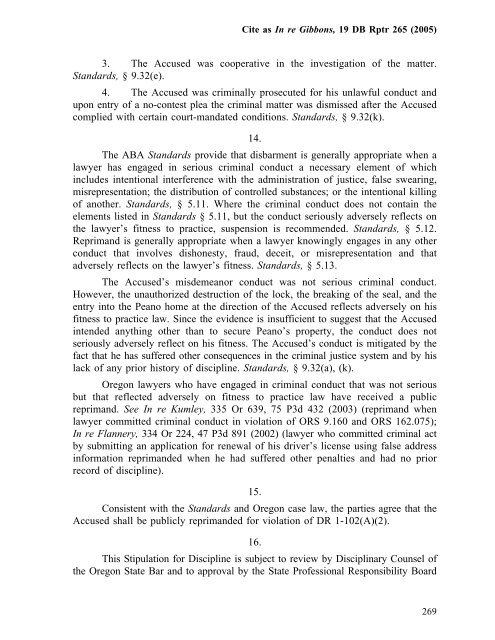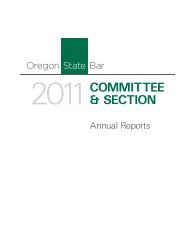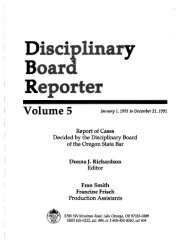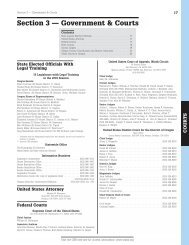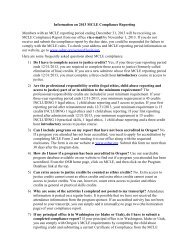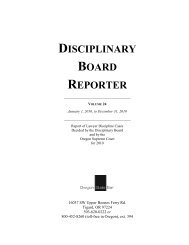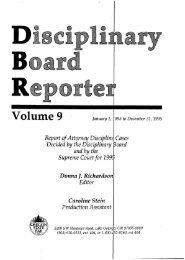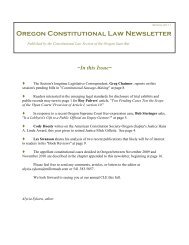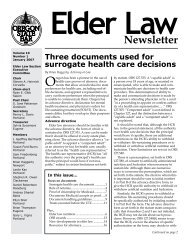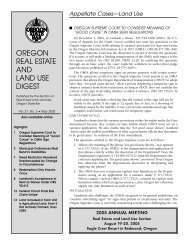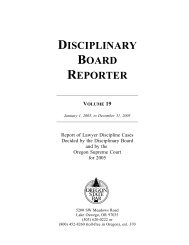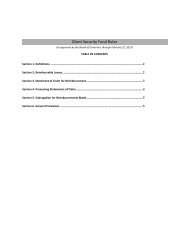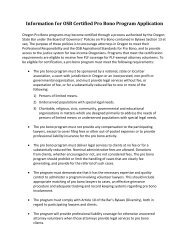- Page 1:
white text DISCIPLINARY BOARD REPOR
- Page 4 and 5:
white text PREFACE This Disciplinar
- Page 6 and 7:
white text Justices of the Oregon S
- Page 8 and 9:
white text 2005 DISCIPLINARY BOARD
- Page 10 and 11:
Cases Reported in Volume 19 In re C
- Page 12 and 13:
Cases Reported in Volume 19 In re K
- Page 14 and 15:
Cases Reported in Volume 19 In re S
- Page 16 and 17:
Cite as In re Klahn, 19 DB Rptr 1 (
- Page 18 and 19:
Cite as In re Klahn, 19 DB Rptr 1 (
- Page 20 and 21:
Cite as In re Dobie, 19 DB Rptr 6 (
- Page 22 and 23:
Cite as In re Dobie, 19 DB Rptr 6 (
- Page 24 and 25:
Cite as In re Botta, 19 DB Rptr 10
- Page 26 and 27:
Cite as In re Botta, 19 DB Rptr 10
- Page 28 and 29:
Cite as In re Botta, 19 DB Rptr 10
- Page 30 and 31:
Cite as In re Henricksen, 19 DB Rpt
- Page 32 and 33:
Cite as In re Henricksen, 19 DB Rpt
- Page 34 and 35:
Cite as In re Henricksen, 19 DB Rpt
- Page 36 and 37:
Cite as In re Koblegarde, 19 DB Rpt
- Page 38 and 39:
Cite as In re Koblegarde, 19 DB Rpt
- Page 40 and 41:
Cite as In re Koblegarde, 19 DB Rpt
- Page 42 and 43:
Cite as In re Cumfer, 19 DB Rptr 27
- Page 44 and 45:
Cite as In re Cumfer, 19 DB Rptr 27
- Page 46 and 47:
Cite as In re Cumfer, 19 DB Rptr 27
- Page 48 and 49:
Cite as In re Cumfer, 19 DB Rptr 27
- Page 50 and 51:
Cite as In re Cumfer, 19 DB Rptr 27
- Page 52 and 53:
Cite as In re Cumfer, 19 DB Rptr 27
- Page 54 and 55:
Cite as In re Cumfer, 19 DB Rptr 27
- Page 56 and 57:
Cite as In re Ryan, 19 DB Rptr 41 (
- Page 58 and 59:
Cite as In re Ryan, 19 DB Rptr 41 (
- Page 60 and 61:
Cite as In re Ryan, 19 DB Rptr 41 (
- Page 62 and 63:
Cite as In re Ryan, 19 DB Rptr 41 (
- Page 64 and 65:
Cite as In re Ryan, 19 DB Rptr 41 (
- Page 66 and 67:
Cite as In re Ryan, 19 DB Rptr 41 (
- Page 68 and 69:
Cite as In re Ryan, 19 DB Rptr 41 (
- Page 70 and 71:
Cite as In re Ryan, 19 DB Rptr 41 (
- Page 72 and 73:
Cite as In re Summer, 19 DB Rptr 57
- Page 74 and 75:
Cite as In re Rich, 19 DB Rptr 60 (
- Page 76 and 77:
Cite as In re Rich, 19 DB Rptr 60 (
- Page 78 and 79:
Cite as In re Rich, 19 DB Rptr 60 (
- Page 80 and 81:
Cite as In re Ames, 19 DB Rptr 66 (
- Page 82 and 83:
Cite as In re Ames, 19 DB Rptr 66 (
- Page 84 and 85:
Cite as In re Ames, 19 DB Rptr 66 (
- Page 86 and 87:
Cite as In re Ames, 19 DB Rptr 66 (
- Page 88 and 89:
Cite as In re Ames, 19 DB Rptr 66 (
- Page 90 and 91:
Cite as In re Ames, 19 DB Rptr 66 (
- Page 92 and 93:
Cite as In re Trukositz, 19 DB Rptr
- Page 94 and 95:
Cite as In re Trukositz, 19 DB Rptr
- Page 96 and 97:
Cite as In re Trukositz, 19 DB Rptr
- Page 98 and 99:
Cite as In re Trukositz, 19 DB Rptr
- Page 100 and 101:
Cite as In re Trukositz, 19 DB Rptr
- Page 102 and 103:
Cite as In re Steele, 19 DB Rptr 87
- Page 104 and 105:
Cite as In re Steele, 19 DB Rptr 87
- Page 106 and 107:
Cite as In re Steele, 19 DB Rptr 87
- Page 108 and 109:
Cite as In re Steele, 19 DB Rptr 87
- Page 110 and 111:
Cite as In re Knappenberger, 19 DB
- Page 112 and 113:
Cite as In re Scharfstein, 19 DB Rp
- Page 114 and 115:
Cite as In re Scharfstein, 19 DB Rp
- Page 116 and 117:
Cite as In re Scharfstein, 19 DB Rp
- Page 118 and 119:
Cite as In re Scharfstein, 19 DB Rp
- Page 120 and 121:
Cite as In re Casey, 19 DB Rptr 105
- Page 122 and 123:
Cite as In re Casey, 19 DB Rptr 105
- Page 124 and 125:
Cite as In re Genna, 19 DB Rptr 109
- Page 126 and 127:
Cite as In re Genna, 19 DB Rptr 109
- Page 128 and 129:
Cite as In re Genna, 19 DB Rptr 109
- Page 130 and 131:
Cite as In re Davis, 19 DB Rptr 116
- Page 132 and 133:
Cite as In re Davis, 19 DB Rptr 116
- Page 134 and 135:
Cite as In re Davis, 19 DB Rptr 116
- Page 136 and 137:
Cite as In re Crews, 19 DB Rptr 122
- Page 138 and 139:
Cite as In re Coggins, 19 DB Rptr 1
- Page 140 and 141:
Cite as In re Leisure, 19 DB Rptr 1
- Page 142 and 143:
Cite as In re Shinn, 19 DB Rptr 128
- Page 144 and 145:
Cite as In re Shinn, 19 DB Rptr 128
- Page 146 and 147:
Cite as In re Shinn, 19 DB Rptr 128
- Page 148 and 149:
Cite as In re Nester, 19 DB Rptr 13
- Page 150 and 151:
Cite as In re Nester, 19 DB Rptr 13
- Page 152 and 153:
Cite as In re Nester, 19 DB Rptr 13
- Page 154 and 155:
Cite as In re Bowles, 19 DB Rptr 14
- Page 156 and 157:
Cite as In re Bowles, 19 DB Rptr 14
- Page 158 and 159:
Cite as In re Bowles, 19 DB Rptr 14
- Page 160 and 161:
Cite as In re Bowles, 19 DB Rptr 14
- Page 162 and 163:
Cite as In re Bowles, 19 DB Rptr 14
- Page 164 and 165:
Cite as In re Gregory, 19 DB Rptr 1
- Page 166 and 167:
Cite as In re Gregory, 19 DB Rptr 1
- Page 168 and 169:
Cite as In re Lebenbaum, 19 DB Rptr
- Page 170 and 171:
Cite as In re Lebenbaum, 19 DB Rptr
- Page 172 and 173:
Cite as In re Lebenbaum, 19 DB Rptr
- Page 174 and 175:
Cite as In re DenHartigh, 19 DB Rpt
- Page 176 and 177:
Cite as In re DenHartigh, 19 DB Rpt
- Page 178 and 179:
Cite as In re DenHartigh, 19 DB Rpt
- Page 180 and 181:
Cite as In re Monson, 19 DB Rptr 16
- Page 182 and 183:
Cite as In re Monson, 19 DB Rptr 16
- Page 184 and 185:
Cite as In re Hendrick, 19 DB Rptr
- Page 186 and 187:
Cite as In re Hendrick, 19 DB Rptr
- Page 188 and 189:
Cite as In re Hendrick, 19 DB Rptr
- Page 190 and 191:
Cite as In re Hendrick, 19 DB Rptr
- Page 192 and 193:
Cite as In re Hendrick, 19 DB Rptr
- Page 194 and 195:
Cite as In re Goyak, 19 DB Rptr 179
- Page 196 and 197:
Cite as In re Goyak, 19 DB Rptr 179
- Page 198 and 199:
Cite as In re Goyak, 19 DB Rptr 179
- Page 200 and 201:
Cite as In re Goyak, 19 DB Rptr 179
- Page 202 and 203:
Cite as In re Goyak, 19 DB Rptr 179
- Page 204 and 205:
Cite as In re Goyak, 19 DB Rptr 179
- Page 206 and 207:
Cite as In re Goyak, 19 DB Rptr 179
- Page 208 and 209:
Cite as In re Matthews, 19 DB Rptr
- Page 210 and 211:
Cite as In re Matthews, 19 DB Rptr
- Page 212 and 213:
Cite as In re Matthews, 19 DB Rptr
- Page 214 and 215:
Cite as In re Kay, 19 DB Rptr 200 (
- Page 216 and 217:
Cite as In re Kay, 19 DB Rptr 200 (
- Page 218 and 219:
Cite as In re Kay, 19 DB Rptr 200 (
- Page 220 and 221:
Cite as In re Foley, 19 DB Rptr 205
- Page 222 and 223:
Cite as In re Foley, 19 DB Rptr 205
- Page 224 and 225:
Cite as In re Foley, 19 DB Rptr 205
- Page 226 and 227:
Cite as In re Langford, 19 DB Rptr
- Page 228 and 229:
Cite as In re Langford, 19 DB Rptr
- Page 230 and 231:
Cite as In re Tuttle, 19 DB Rptr 21
- Page 232 and 233: Cite as In re Tuttle, 19 DB Rptr 21
- Page 234 and 235: Cite as In re Tuttle, 19 DB Rptr 21
- Page 236 and 237: Cite as In re Tuttle, 19 DB Rptr 21
- Page 238 and 239: Cite as In re Tuttle, 19 DB Rptr 21
- Page 240 and 241: Cite as In re Tuttle, 19 DB Rptr 21
- Page 242 and 243: Cite as In re Andersen, 19 DB Rptr
- Page 244 and 245: Cite as In re Andersen, 19 DB Rptr
- Page 246 and 247: Cite as In re Andersen, 19 DB Rptr
- Page 248 and 249: Cite as In re Jackson, 19 DB Rptr 2
- Page 250 and 251: Cite as In re Jackson, 19 DB Rptr 2
- Page 252 and 253: Cite as In re Jackson, 19 DB Rptr 2
- Page 254 and 255: Cite as In re Richardson, 19 DB Rpt
- Page 256 and 257: Cite as In re Richardson, 19 DB Rpt
- Page 258 and 259: Cite as In re Richardson, 19 DB Rpt
- Page 260 and 261: Cite as In re Richardson, 19 DB Rpt
- Page 262 and 263: Cite as In re Lancefield, 19 DB Rpt
- Page 264 and 265: Cite as In re Lancefield, 19 DB Rpt
- Page 266 and 267: Cite as In re Simcoe, 19 DB Rptr 25
- Page 268 and 269: Cite as In re Simcoe, 19 DB Rptr 25
- Page 270 and 271: Cite as In re Damiano, 19 DB Rptr 2
- Page 272 and 273: Cite as In re Damiano, 19 DB Rptr 2
- Page 274 and 275: Cite as In re Oliveros, 19 DB Rptr
- Page 276 and 277: Cite as In re Oliveros, 19 DB Rptr
- Page 278 and 279: Cite as In re Oliveros, 19 DB Rptr
- Page 280 and 281: Cite as In re Gibbons, 19 DB Rptr 2
- Page 284 and 285: Cite as In re Gibbons, 19 DB Rptr 2
- Page 286 and 287: Cite as In re Lyons, 19 DB Rptr 271
- Page 288 and 289: Cite as In re Lyons, 19 DB Rptr 271
- Page 290 and 291: Cite as In re Lyons, 19 DB Rptr 271
- Page 292 and 293: Cite as In re Marsh, 19 DB Rptr 277
- Page 294 and 295: Cite as In re Marsh, 19 DB Rptr 277
- Page 296 and 297: Cite as In re Marsh, 19 DB Rptr 277
- Page 298 and 299: Cite as In re Marsh, 19 DB Rptr 277
- Page 300 and 301: Cite as In re Marsh, 19 DB Rptr 277
- Page 302 and 303: Cite as In re O’Dell, 19 DB Rptr
- Page 304 and 305: Cite as In re O’Dell, 19 DB Rptr
- Page 306 and 307: Cite as In re O’Dell, 19 DB Rptr
- Page 308 and 309: Cite as In re O’Dell, 19 DB Rptr
- Page 310 and 311: Cite as In re O’Dell, 19 DB Rptr
- Page 312 and 313: Cite as In re Carreon, 19 DB Rptr 2
- Page 314 and 315: Cite as In re Carreon, 19 DB Rptr 2
- Page 316 and 317: Cite as In re Miller, 19 DB Rptr 30
- Page 318 and 319: Cite as In re Miller, 19 DB Rptr 30
- Page 320 and 321: Cite as In re Derby, 19 DB Rptr 306
- Page 322 and 323: Cite as In re Derby, 19 DB Rptr 306
- Page 324 and 325: Cite as In re Derby, 19 DB Rptr 306
- Page 326 and 327: Cite as In re Derby, 19 DB Rptr 306
- Page 328 and 329: Cite as In re Derby, 19 DB Rptr 306
- Page 330 and 331: Cite as In re Idiart, 19 DB Rptr 31
- Page 332 and 333:
Cite as In re Idiart, 19 DB Rptr 31
- Page 334 and 335:
Cite as In re Idiart, 19 DB Rptr 31
- Page 336 and 337:
Cite as In re Chase, 19 DB Rptr 322
- Page 338 and 339:
Cite as In re Johnson, 19 DB Rptr 3
- Page 340 and 341:
Cite as In re Johnson, 19 DB Rptr 3
- Page 342 and 343:
Cite as In re Johnson, 19 DB Rptr 3
- Page 344 and 345:
Cite as In re Eichelberger, 19 DB R
- Page 346 and 347:
Cite as In re Eichelberger, 19 DB R
- Page 348 and 349:
Cite as In re Eichelberger, 19 DB R
- Page 350 and 351:
Cite as In re Eichelberger, 19 DB R
- Page 352 and 353:
Cite as In re Camacho, 19 DB Rptr 3
- Page 354 and 355:
Cite as In re Camacho, 19 DB Rptr 3
- Page 356 and 357:
Cite as In re Camacho, 19 DB Rptr 3
- Page 358 and 359:
Cite as In re White, 19 DB Rptr 343
- Page 360 and 361:
Cite as In re White, 19 DB Rptr 343
- Page 362 and 363:
Cite as In re White, 19 DB Rptr 343
- Page 364 and 365:
Cite as In re White, 19 DB Rptr 343
- Page 366 and 367:
Cite as In re Kahn, 19 DB Rptr 351
- Page 368 and 369:
Cite as In re Kahn, 19 DB Rptr 351
- Page 370 and 371:
Cite as In re Kahn, 19 DB Rptr 351
- Page 372 and 373:
Cite as In re Wilson, 19 DB Rptr 35
- Page 374 and 375:
Cite as In re Wilson, 19 DB Rptr 35
- Page 376 and 377:
Cite as In re Wilson, 19 DB Rptr 35
- Page 378 and 379:
Cite as In re Dickerson, 19 DB Rptr
- Page 380 and 381:
Cite as In re Dickerson, 19 DB Rptr
- Page 382 and 383:
Cite as In re Peterson, 19 DB Rptr
- Page 384 and 385:
Cite as In re Peterson, 19 DB Rptr
- Page 386 and 387:
Cite as In re Peterson, 19 DB Rptr
- Page 389 and 390:
TABLE OF CASES (References are to t
- Page 391 and 392:
Table of Cases In re Jordan, 295 Or
- Page 393 and 394:
Table of Cases In re Wyllie, 331 Or
- Page 395 and 396:
Table of Rules and Statutes DR 3-10
- Page 397 and 398:
Table of Rules and Statutes DR 7-11
- Page 399:
TABLE OF BAR RULES OF PROCEDURE (Re


